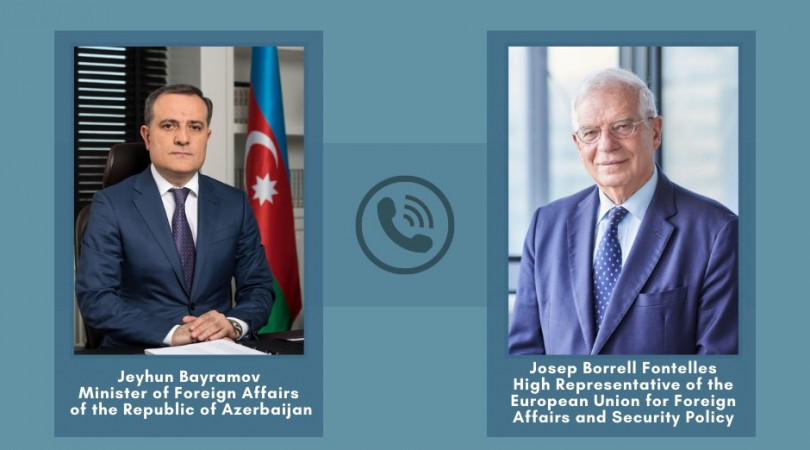Azerbaijani foreign minister, EU official mull latest situation in Nagorno-Karabakh

By Vafa Ismayilova
Azerbaijani Foreign Minister Jeyhun Bayramov and EU High Representative for Foreign Affairs and Security Policy Josep Borrell discussed by phone the latest situation in the Nagorno-Karabakh region on November 12.
"The sides exchanged views on the latest situation in the region, signing of a tripartite statement on a complete ceasefire and cessation of all hostilities, including the withdrawal of the Armenian armed forces from the surrounding regions of the Nagorno-Karabakh region of Azerbaijan on the basis of the UN Security Council resolutions, return of IDPs to their homes, implementation of humanitarian exchanges, as well as the issues of opening all communications including the construction of new communication lines,” the ministry reported on November 13.
High Representative Joseph Borell praised the signing of a trilateral statement by Azerbaijani President Ilham Aliyev, Armenian Prime Minister Nikol Pashinyan and Russian President Vladimir Putin on November 10. He stressed the importance of respecting the agreement and ensuring its implementation. Joseph Borell stressed the need to continue the dialogue between the parties, the ministry said.
Under the deal, Russian peacekeepers are deployed in the region to patrol frontlines. Turkey also takes part in the peacekeeping process. Russia and Turkey signed a deal on creating a Russian-Turkish joint ceasefire monitoring centre. It also envisages the de-occupation of Azerbaijan’s Kalbajar, Aghdam and Lachin regions by December 1 as well as the return of Azerbaijani IDPs to Azerbaijan’s Nagorno-Karabakh and the seven adjacent regions under the control of the United Nations High Commissioner for Refugees.
The clashes between Armenia and Azerbaijan resumed after Armenia launched large-scale attacks on Azerbaijani forces and civilians on September 27. Five Azerbaijani civilians were killed on the first day of the Armenian attacks. Ninety-three Azerbaijani civilians were killed in Armenian's indiscriminate attacks on Azerbaijani civilians. Azerbaijan launched counter-offensive operations that ended in the liberation of over 300 settlements, villages. Azerbaijan also liberated five city centres and the historic Shusha city.
The peace agreement ended the 30-years-old conflict between Baku and Yerevan over Azerbaijan’s Nagorno-Karabakh region that along with the seven adjacent districts came under the occupation of Armenian armed forces in the war in the early 1990s. For about three decades, Armenia failed to implement the UN Security Council resolutions (822, 853, 874 and 884) demanding the withdrawal of its troops, which was the main obstacle to the resolution of the conflict.
The OSCE Minsk Group co-chaired by the United States, Russia and France had been mediating the Armenian-Azerbaijani conflict since the signing of the volatile cease-fire agreement in 1994. The Minsk Group’s efforts resulted in no progress as Armenia refused to abide by the UN Security Council resolutions.
--
Follow us on Twitter @AzerNewsAz
Here we are to serve you with news right now. It does not cost much, but worth your attention.
Choose to support open, independent, quality journalism and subscribe on a monthly basis.
By subscribing to our online newspaper, you can have full digital access to all news, analysis, and much more.
You can also follow AzerNEWS on Twitter @AzerNewsAz or Facebook @AzerNewsNewspaper
Thank you!
